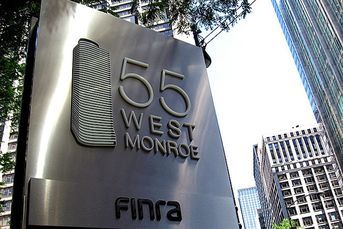Settlement with SEC a black eye for Finra (updated)

The SEC’s announcement yesterday that it had threatened to sanction Finra because a senior official doctored minutes from…
The SEC’s announcement yesterday that it had threatened to sanction Finra because a senior official doctored minutes from internal staff meetings is an embarrassing black eye to the securities industry’s watchdog as it pushes to expand its authority to regulate investment advisers.
In an unusual move, the Securities and Exchange Commission on Thursday took the Financial Industry Regulatory Authority Inc. to task for inadequate internal policies and procedures stemming from an SEC inspection of Finra’s Kansas City office in August 2008.
The incident marked the third time in eight years that an official from Finra or its predecessor, NASD, gave altered or misleading documents to the SEC, according to the commission. Each of the three instances of document doctoring in the past eight years involved different people.
Without admitting or denying charges, Finra agreed to the SEC’s findings and unveiled steps it had taken to prevent the infraction from occurring again.
The incident comes as Finra is lobbying the SEC and Congress for more authority to oversee investment advisers. Critics have long maintained that Finra operates under a lack of accountability, transparency and oversight. The SEC’s action could have real political fallout for Finra, one securities attorney said.
“This is a black eye for Finra and will likely be exploited by people who don’t want Finra to be the SRO for registered investment advisers,” said Brian Rubin, a partner with Sutherland Asbill & Brennan LLP.
Mercer Bullard, a professor of law at the University of Mississippi, which is in the middle of assembling its own SRO for advisers, dismissed the notion that Finra’s credibility would be hurt by this latest incident.
“This incident really has no bearing on FINRA’s qualification to be an SRO for investment advisers,” he wrote in an e-mail.
Finra spokesman Nancy Condon said that the organization, which oversees 4,500 broker-dealers and 634,000 registered representatives, is disappointed about the situation.
“We very much regret this occurrence,” she said. “We hold ourselves to a high standard, and we have put extensive procedures in place to safeguard against problems like this occurring in the future.”
On Thursday, the SEC released an administrative-proceeding order that gave details of the matter. The order, however, didn’t reveal the details of what the Finra official, former director of its Kansas City office Thomas Clough, was attempting to hide.
Industry lawyers and executives were quick to note that the SEC didn’t charge him but accepted a settlement with Finra over the matter.
Finra’s settlement with the SEC, which requires the self-regulatory organization to hire an outside consultant to examine its procedures regarding saving documents, comes as an increasing number of broker-dealers are closing and frustration from the securities industry builds with the organization.
Some noted that Finra likely would have castigated a broker-dealer for doctoring records that the regulator wanted to see.
“Had a broker or a firm done what Finra apparently did, in responding to Finra, that broker or firm would not be treated near as lenient as Finra was here,” said Joel Beck, founder of The Beck Law Firm LLC and a former Finra enforcement attorney.
Under its own sanction guidelines, Finra would consider a fine, suspension or even a bar for falsification of documents, depending on the seriousness of the violation, he said.
Finra wasn’t fined, and no individuals were named in the settlement.
“On August 7, 2008, hours before furnishing the commission inspection staff” with information, “the director caused the minutes for meetings that took place on Aug. 28, 2006, Sept. 22, 2006, and Jan. 31, 2007, to be altered,” the SEC said in its administrative proceeding.
“Specifically, certain information was deleted or edited, while in other instances, entire passages were removed or changed. With respect to all three altered documents, the original author’s signature was changed to the director’s,” the SEC said.
“The law requires Finra to produce the documents the SEC seeks in its examinations in complete and accurate form,” Gerald Hodgkins, associate director of the SEC’s enforcement division, said in a statement. “Although Finra has previously taken steps to improve compliance, those enhancements did not go far enough to prevent the document production failure that occurred in its Kansas City [Mo.] district office.”
The order aims to help Finra improve weaknesses in its training and procedures, Mr. Hodgkins said.
It is rare for the SEC to bring a case against an SRO, and this settlement comes at a time when the commission is considering ways to boost investment adviser oversight and is looking at whether Finra could act as an SRO for investment advisers similar to its role for broker-dealers.
A whistle blower notified Finra of the altered minutes in June 2010.
Ms. Condon confirmed that Mr. Clough ran the Kansas City office during the time in question, and he “left the organization after the issue came to light.”
He was replaced by Scott DeArmey.
Mr. Clough couldn’t be reached for comment.
When the alleged document doctoring took place, Finra’s chief executive was Mary Schapiro, who is now chairman of the SEC.
Current Finra chief executive Richard Ketchum said in a statement that the SRO reported the document issue to the SEC and cooperated with the commission staff that reviewed it.
“Following our own internal review, we took decisive action, including appointing new leadership in our Kansas City office and instituting a number of changes that strengthened document-handling procedures across the organization,” he said.
The changes Finra already made include additional online and live ethics training for all employees, and more focus on document integrity, the self-regulator said.
Learn more about reprints and licensing for this article.




